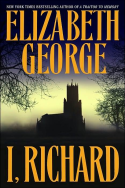 Are You in the House Alone? by Richard Peck
Are You in the House Alone? by Richard Peck
Are You in the House Alone? came out in 1976 and though I totally could’ve read it when I was a teen—and thus still a member of its target audience—I never did.
Gail Osburne is a sixteen-year-old high school junior and native New Yorker who’s not at home in the quaint Connecticut village her family relocated to several years back. I knew that the plot involved Gail receiving menacing anonymous notes and phone calls, and I was expecting these events to get started quickly and the suspense to remain high throughout. But that doesn’t happen.
Instead, the story is told retroactively, so we know Gail survives. Also, obvious culprit is obvious. (I hope the reveal wasn’t intended to be a surprise, but perhaps readers were less savvy about such things in 1976.) Initially, much more of the focus is on Gail’s relationships with her parents, boyfriend, and best friend, and in particular how the latter two are in the slow process of dissolution. Eventually she receives some threatening notes and creepy phone calls, gets scared, is let down by people in positions of authority, and comes face-to-face with said obvious culprit. That happens halfway through this slim novel. The rest of the book is about Gail’s recovery from her ordeal.
I thought Are You in the House Alone? was going to be fun, suspenseful fluff, but it turned out to be fairly serious and occasionally (intentionally) infuriating. I really appreciated how Peck was able to weave in a couple of threads that seemed very random at first and make them integral to the denouement, too. Ultimately, I didn’t love the book, but I kind of… respect it, if that makes sense. It didn’t go the cheap route.
 The Automatic Detective by A. Lee Martinez
The Automatic Detective by A. Lee Martinez
Mack Megaton is a hulking robot who was created to destroy. He developed self-determination, however, and went against his programming. Now, he’s a probationary citizen of Empire City, where mutagens and pollution have created a very diverse population. While some “biologicals” are still “norms,” others have been physically transformed (like rat-like Detective Alfredo Sanchez) and others have been changed in not-so-visible ways (like Mack’s friend, Jung, a talking gorilla with refined literary taste). Mack works as a cab driver and is trying to keep a low profile, but when his neighbors are abducted, he can’t help but try to rescue them. This gets him into all sorts of trouble, of course.
Despite its name, The Automatic Detective isn’t really much of a mystery. I suppose it’s more… sci-fi noir. Mack meets various thugs, beats some of them up, gets beat up himself, etc. Slowly, he makes progress on uncovering a huge conspiracy. At times, I felt like Martinez was a little too enamored of the gimmick he created, and places in the middle dragged a bit as a result, but the ending is pretty satisfying and overall the book was enjoyable enough, even though it’s quite far from the sort of thing I usually read.
As a final note: I really liked that Martinez limited himself when it came time to invent universe-specific profanity. Instead of the text being liberally sprinkled with words like “frell” or “frak,” the phrase “Oh, flurb” appears but once (during a moment where the meaning is 100% apparent) and made me laugh out loud.
I don’t know if I’m necessarily eager to read more by Martinez, but I’m glad I read this one.
 The Inimitable Jeeves by P. G. Wodehouse
The Inimitable Jeeves by P. G. Wodehouse
When I read My Man Jeeves back in 2010, I was somewhat disappointed because so much of it was repetitive. While there are some common elements that recur within the eleven stories that comprise The Inimitable Jeeves, it is still so very much superior that I’d now say… forget about that first book. Start here. Go back and read My Man Jeeves for completist purposes, if that’s your inclination, but start here for the best introduction to these characters and Wodehouse’s uniquely charming and amusing writing.
First published in 1923, The Inimitable Jeeves contains a linked set of stories that typically involve affable Bertie Wooster being imposed upon by either his eternally lovesick friend Bingo Little (who is “always waylaying one and decanting his anguished soul”) or his mischief-making younger cousins, Claude and Eustace. One plot thread involves convincing Bingo’s uncle (who provides him with an allowance) to agree to Bingo marrying a waitress. Jeeves comes up with the idea to ply the uncle with romance novels featuring class differences to soften his heart, and it ends up that Bertie is compelled to go visit the old fellow and claim to be the author. In addition to containing the most elegant description of sweat I’ve ever seen—“The good old persp was bedewing my forehead by this time in a pretty lavish manner.”—this situation is referenced a few times in subsequent stories until Bingo succeeds in getting married to a different waitress who really is the author of those romance novels.
So, even though you’ve got episodic happenings, it’s rather a satisfactory conclusion. Bertie is endearing, Jeeves is competent, the writing is excellent, and it made me laugh. (I especially liked when a character was described as resembling “a sheep with a secret sorrow.”) I’m so glad that I didn’t give up on the series after the first book; now I feel as though I finally see what the fuss is all about. I’d also like to give credit to the fabulous narration by Jonathan Cecil. I’m not sure if it’s deliberate, but I hear echoes of Fry and Laurie in his performance, and I heartily approve. I will certainly seek out more unabridged versions read by him.
 The Murders of Richard III by Elizabeth Peters
The Murders of Richard III by Elizabeth Peters
This is the second in the Jacqueline Kirby series of mysteries. I haven’t read the first, and wouldn’t normally begin with the second, but the book promised an English country mansion plus “fanatic devotees of King Richard III” so my usual routine flew right out the window.
Even before university lecturer Thomas Carter likened himself unto Watson, I’d noticed the similarities between how this tale is told and the Sherlock Holmes stories. We are never permitted inside Jacqueline’s head. Instead, we see her how Thomas, hopeful of one day securing her romantic affections, views her. It’s fairly interesting, actually, because Thomas’ opinion of her fluctuates, sometimes peevishly. “You drive me crazy with your arrogance and your sarcasm and your know-it-all airs,” he says at one point. And though he soon after claims “I’m no male chauvinist; I don’t mind you showing off,” the fact is that earlier he was grumbling inwardly about her feigning “girlish ignorance” to reel in mansplainers and then walloping the “unwitting victim” with a cartload of knowledge. It’s true that Jacqueline isn’t especially likeable sometimes, but for remorselessly trouncing the sexist louts she encounters throughout the book, I must commend her!
The mystery itself is somewhat bland, unfortunately. The leader of a Ricardian society has received a letter purportedly written by Elizabeth of York, which would exonerate Richard of the deaths of her brothers, the “princes in the tower.” He calls a meeting of the society, with each attendee costumed as one of the historical personages involved, and summons the press, planning to unveil his find with much fanfare. But someone begins playing practical jokes on the Ricardians reminiscent of the fates of the people they are pretending to be. The book isn’t a long one, and soon the pranks start coming right on the heels of one another. Because of the swift pace—and some shallow characterization—the solution is rather anti-climactic.
Still, while I’m not sure I’ll seek out any more Jacqueline Kirby mysteries, this was overall a decent read.
 A Perfect Match by Jill McGown
A Perfect Match by Jill McGown
The series of books featuring Detective Inspector Lloyd (whose first name is a secret for now) and Detective Sergeant Judy Hill begins with a short yet enjoyable mystery in which a wealthy young widow is found dead in a small English town on property she’d just inherited from her recently deceased husband. Unlike some mysteries of which I am fond, there’s no preamble where readers get to know the victim or the circumstances of their life. Instead, immediately there’s a policeman discovering the body and then Lloyd turns up to question the victim’s next of kin. This same lack of character development hampers the romantic tension between Lloyd and Hill, leaving me with no idea what motivated Hill to finally decide to act on her feelings for him, betraying her marriage vows in the process.
The mystery itself is interesting enough, however, involving long-married Helen and Donald Mitchell who have ties to both the victim, Julia—her late husband was Donald’s older brother and Helen thinks they were having an affair—and chief suspect, Chris, originally a friend of Donald’s who has fallen in love with Helen. I can’t claim to have mustered anything more than a mild curiosity as to what the outcome would be, but neither did I guess the specifics, so that was good. I liked the interrogation scenes, too.
McGown’s writing had some fun moments. I loved the super-evocative imagery of Lloyd telling Hill that her new perm makes her look like Kevin Keegan. I also really appreciated a recurring bit where each chapter ends with the point of view of wildlife. When Chris is eventually brought in by the police, his arrest is depicted from a bird’s perspective, for example. There are also ducks, a moth, a fly, a cat… I don’t know if this device recurs in later books in the series, but I look forward to finding out.
 Reconstructing Amelia by Kimberly McCreight
Reconstructing Amelia by Kimberly McCreight
This is the second mystery/thriller I’ve read in which a single mom who is a lawyer with a cold and unfeeling mother of her own attempts to work out the mystery of what happened to a family member (the other being Girl in the Dark by Marion Pauw). Is that some kind of trend these days?
Kate Baron has a demanding job at a swanky firm, but she’s trying her best to be a good mom to her fifteen-year-old bookworm daughter, Amelia. She’s shocked to get a call from Grace Hall, the prestigious private school Amelia attends, saying that her daughter has been accused of cheating, and by the time she makes her way to the school, Amelia has evidently jumped to her death from the school roof. The police are only too happy to classify her death as a suicide, but when Kate gets a text that says “Amelia didn’t jump,” she starts trying to put together the pieces of what happened.
Reconstructing Amelia has quite a few problems. Despite her better judgment (and a promise to her best friend), Amelia joins a clique of bitchy girls at school who end up publicly humiliating her and trying to get her expelled when she falls in love with someone deemed off-limits. It’s hard to muster sympathy for what she ends up going through when one remembers the cruel prank she was willing to pull on someone else as part of the initiation process (largely kept off-camera to keep us from disliking her too much, I guess). We’re repeatedly told about the great relationship Amelia and her mom share, but never shown it. The subplot about Amelia’s dad is the literary equivalent of wilted lettuce. And the fact that the new detective who gets assigned to the case allows Kate to question suspects is absolutely ludicrous.
And yet, I couldn’t hate the book, largely because of Amelia’s friend, Sylvia. For much of the book she comes across as shallow and self-absorbed, but when Amelia really needs her, she’s there. She gives Amelia this tour of “great moments at Grace Hall” to cheer up her impressive pal, right before breaking down about her own legitimate pain. I never would’ve thought at the outset that I would have such immense sympathy for Sylvia, but I do. I find myself hoping that she’ll be okay.
 Shutter Island by Dennis Lehane
Shutter Island by Dennis Lehane
It sure is nice going into a book unspoiled, particularly one as twisty as Shutter Island. I was quite happy with the book as it began, with U.S. Marshals Teddy Daniels and Chuck Aule taking the ferry to Shutter Island to track down a patient missing from Ashcliffe Hospital for the Criminally Insane. It’s late summer 1954, and these guys are manly but accessible, and surprisingly funny. Consider this relatiely early exchange that cracked me up:
Pretentious Doctor: *makes remarks on the lives of violence the marshals must lead*
Chuck: Wasn’t raised to run, Doc.
Pretentious Doctor: Ah, yes. Raised. And who did raise you?
Teddy: Bears.
For a while, all seems straightforward. Then Teddy confides to Chuck that he’s actually come there looking for a patient named Andrew Laediss, who was responsible for setting the fire that killed Teddy’s wife two years before. Gradually, one starts to doubt everything (and there was a point where all of the uncertainty got to be a little much for me) but the ultimate conclusion is a very satisfactory one.
 Why Did You Lie? by Yrsa Sigurdardottir
Why Did You Lie? by Yrsa Sigurdardottir
Set in Iceland, Why Did You Lie? starts out with three different storylines taking place a few days apart. The first involves a photographer on a helicopter journey to take pictures of a lighthouse on a rock in the middle of the ocean, the second is about a policewoman whose journalist husband has recently attempted suicide, and the third is about a family who returns from a house swap with an American couple to find some of their stuff missing and weird footage on the security camera. Of course, as the book progresses, these storylines converge, and it’s pretty neat when the police activity the helicopter flew over in chapter one turns out to be almost the culmination of the policewoman’s plot thread.
For some reason, I can’t help wondering how Ruth Rendell might’ve written this book. I think Rendell would’ve done a lot more with characterization, for one thing. There’s certainly some here, especially for the anxious husband who struggles to make his wife admit something really has gone wrong with their houseguests, but the primary concern seems to be getting on with the suspenseful action. Quickly, each plot features some kind of creepy lurker and then ominous notes (variations on the “why did you lie?” theme) figure in to all three, as well. Nina, the policewoman, digs around and talks to people and works out that everything connects to a supposed suicide from thirty years ago.
The result is certainly an entertaining book, but not one I could really love. One major issue I had is being able to predict something very significant. The number of characters who could’ve been angry enough about the 30-year-old lies in question to terrorize people in the present is very small. And once the existence of a certain person is oh-so-casually mentioned two-thirds through the book, I thought, “Oh, well, it’s them, then.” And then a little later, I figured out which of the characters it must be and I was right. This made for an anticlimactic ending that was clearly meant to be a shocking one. Also, I would’ve liked to have cared more that one character ends the novel poised to move on with life but, in reality, still in jeopardy.
I still would read more by this author, though.













Recent Comments